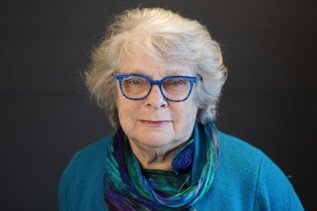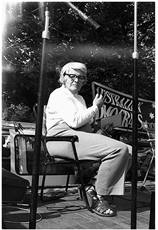Due to scheduled maintenance, the National Library’s online services will be unavailable between 8pm on Saturday 7 December and 11am on Sunday 8 December (AEDT). Find out more.
The National Library has a range of Fellowships and Scholarships available to researchers, writers, artists, and younger scholars.
Martie Lowenstein is the recipient of the 2023 National Folk Fellowship. We spoke to Martie to learn more about her Fellowship and research topic, ‘What Wendy found – the story of 1969 outback Australian Folklore expedition.’

Martie’s Fellowship will result in a documentary that will screen at the 2023 National Folk Festival in Canberra. This will combine Martie’s research with the editing and film-making skills of her brother, Richard. A presentation of this project at the National Library will follow later in 2023.
Why did you want to research at the National Library?
I wanted to research at the National Library because this is where the relevant archives, especially early Australian oral history recordings, are held. I accessed the archived recordings and manuscripts of the early Australian Folk revival and the papers of my mother, Wendy Lowenstein.
My mother was a pioneering Australian oral historian and writer. She was an innovative and energetic woman who started the Folklore Society of Victoria and the Oral History Society of Victoria. She edited ‘Australian Tradition’, a journal which published the Australian songs collected by folklorists and contemporary folk songs written in the 1960s. She was very influential in the early folk music movement in Australia, starting in 1953.

For this project, I also accessed her considerable collection of recordings, known as the ‘Australian Folklore Expedition’. When my brothers and I were children, our family went on a year-long trip around Australia in 1969. It was an incredible year in our lives where my mother collected songs and stories from outback Australia. It was her first step into oral history. In the towns we visited, she would look for interesting local characters and good storytellers. Many hours of interviews were recorded, so it was quite a mix of material. It wasn’t always planned who she would talk to, compared to some of her later, directed oral history projects. These recordings are held in the National Library so I was keen to access them. The collection was still in tape format, yet beautifully preserved. I kept following up the progress and when the Library was able to finally digitise the collection, I was really excited. I told Shelley, the then curator of Oral History at the National Library, that it was a great Christmas present!
While Mum turned four of her other collections into books, the recordings from 1969 had not been looked at, and she never published these. I wanted to make them available to others and thought it would make a good documentary as there are also many great outback photos in our family collection.
Since Mum’s passing, I have appreciated how other people saw her as an important figure in the Australian Folk movement, and an interesting writer of Australian oral history. It was a story worth documenting. I’m lucky enough to have a brother, Richard, who is a well-known filmmaker of Australian music documentaries. This gives me an opportunity that most research fellows don’t have to produce a story.
How did your time at the National Library help you to advance your research?
I’ve been researching my topic for over 11 years, mostly online and by email, with occasional short visits to the Library each year. Thanks to the National Folk Fellowship, having a longer stay to do this research meant I found the material suited to making the documentary, and there was a deadline to produce the completed work.
I knew from Trove that the relevant archives existed, but to have the opportunity to come to Canberra and look through the actual archives was very different to viewing them online. It was more alive, more real.
What do you hope people learn from your project?
I hope people learn more of the experiences of Australia’s everyday history, both the daily battles and the amusing times, which helped form our national characteristics. It’s important to realise these experiences are constantly changing but are well worth preserving for the future.
What did you discover that you want to share?
I have been working from material that covers the experiences of my family and childhood. Whilst I have memories of the music, the festivals, and the trips to collect oral history, they’re the memories of a child. I didn’t know the full story.
These early oral history recordings provide a fascinating, almost unbelievable story. They’re told by people who experienced a very different outback life, without cars or trucks, without medical assistance, television, and internet. For entertainment, there was home-made music, tall stories, poems, and yarns about life in early 20th century outback Australia.
If I make a documentary, the Library can use it to promote its work and collections. It’s a more modern way of promoting the Library’s work and people can visit this collection online. It’s a significant improvement that people can now research their topic and listen to many of the oral histories online.
Why would you recommend the National Folk Fellowship to others?
It’s exciting and interesting to have time to completely devote to a research project. This Fellowship gives you the resources and a timeframe to complete a project such as mine, which I’ve been working on for a long time.
The support of the National Library and the Fellowship gives the impetus to pursue your area of expertise and historical interest. Without the Fellowship, it’s easy to lose the inspiration to complete the journey which is otherwise often lonely work.
Learn more about the collection of Wendy Lowenstein’s material held by the Library. You can also listen to some of Wendy’s oral histories online.
The National Folk Fellowship is offered jointly by the National Library and the National Folk Festival. The National Library holds the most significant collections of folklore and related material in Australia. This Fellowship offers an opportunity for the recipient to discover and explore original collected material at the Library for use in their own artistic work. The outcome of this residency at the National Library will result in a performance at the 2024 National Folk Festival, and any recordings arising from the project will be acquired for the National Library’s Oral History and Folklore collection.
You can read more about the National Library’s Fellowship and Scholarship programs on our website.
Please note: The National Library is undertaking a review of its Fellowships and Scholarships program to ensure it meets the needs of researchers, PhD students and creators. This review may result in changes to some of the opportunities offered beyond 2024.